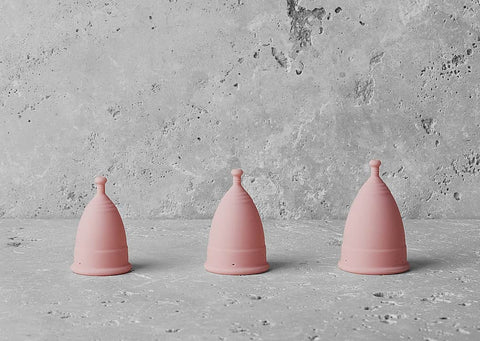The history of the period cup & why everyone should go nüdie!
The history of the period cup & why everyone should go nüdie!
If you’re someone who menstruates, chances are you’ve heard of (or perhaps even tried) a period cup. Although the period cup – the reusable period care option that collects, rather than absorbs, menstrual fluid – has gained serious traction as of late, did you know that it’s been around since the 1930s?
Period cups have come a long way since then, offering those who menstruate a reusable alternative to tampons, pads and liners. Whether you’re someone with a heavy flow (a period cup can hold three times the menstrual fluid of a very light tampon), or an eco-warrior trying to cut back on waste (it’s also reusable for up to 10 years), the humble period cup is one of Unfabled's favourite period care products. We can’t wait to tell you why – but first, a little history of how they came about...
1930s
If you thought period cups were created by an environmentally-minded millennial, think again – the period cup was actually the brainchild of 1930s female inventor, Leona Chalmers. Like the multi-talented Hollywood actress Hedy Lamarr (a major film star who also happened to invent an early version of what we now know as WiFi), Leona was an American-born author, actress and inventor who was determined to help women go about their daily lives, even during their periods.
Prior to Leonas’ invention, people often used rags, cotton wool or other makeshift period products to absorb period blood, but her cup – first referred to as a ‘catamenial receptor’ – allowed people to take control of their period care. The first prototype was patented and brought to market in 1937, but it failed to sell as many complained it was too rigid and difficult to insert. Leona Chalmers then went on to create her second iteration, made of softer ‘vulcanised’ rubber, paving the way for the period cups of today.
1950s
Even after Leona introduced her softer period cup to America, her cup failed to take off as disposable period products were first brought to the United States. Many people still felt a sense of shame around handling their own period blood (something which can still be an issue today), and some even felt that inserting anything into the vagina would make them ‘impure’ – a belief that was unfortunately perpetuated by some doctors.
Two decades after the period cup was first created, businessman Robert Oreck decided to reintroduce his version of the period cup, the ‘Tassaway’. But this time with a marketing push. His best-known advertisement read, 'Change only 6 times a period!'
However, despite Oreck's efforts to convince women of the menstrual cup's benefits over tampons and pads, the Tassaway failed to make a profit. The period cup disappeared from the menstrual care scene altogether, later re-emerging in the 1980s when it finally began to gain some traction.
1980s
After the sexual liberation era (and as Jane Fonda-style cardio workouts became a regular fixture in the lives of many!), people became more receptive to the idea of a period care option that would help them live and move freely during their periods. Earlier iterations of the period cup were made of rubber, but a new latex version called The Keeper entered the scene, and it’s still on the market today.
While the newer latex version is more comfortable than the rubber cups, it’s not hypoallergenic. Modern-day cup makers have explored newer materials to give those who menstruate a fuss-free, hypoallergenic period care option.

Now & The Nüdie:
With the move from rubber to silicone, period cups have become a mainstream period care option for those with a heavy flow, those living a zero-waste lifestyle or those looking for an alternative to traditional pads, tampons and liners. But many cups are still not as ergonomic or as user-friendly as needed.
Introducing &SISTERS and Claire Lettice, co-founder of the eco-friendly period care brand, who set about creating the ultimate reusable alternative to tampons and pads. In accordance with her mantra ‘designed by women, for women’, Claire worked with a young female architecture graduate over many months to perfect the uniquely designed &SISTERS Nüdie Cup.

Like the first period cup, the &SISTERS nüdie period cup collects, rather than absorbs menstrual fluid. This is not all the nüdie has to offer, it has many body and planet-friendly benefits:
- Made from hypoallergenic, medical-grade silicone: pH-neutral, anti-microbial and recommended by gynaecologists, perfect for keeping thrush at bay.
- Wear your nüdie for up to 12 hours: Unlike tampons that can only be worn for a maximum of eight hours, period cups can be worn for longer, minimising trips to the loo.
- Choose the size that suits you: The nüdie comes in three sizes to suit various ages, life stages and flows.
- Track your flow with internal volume markings: If you’re curious about your menstrual output, our handy volume markings can help you track your flow over the course of your cycle.
- Easily remove with the Pebble Pull™ stem and Tri-Flow™ holes: The Pebble Pull™ stem allows for comfortable use and easy removal, and the Tri-Flow™ holes allow for gentle suction release.
- Use your nüdie for up to 10 years: With proper care and use, the nüdie can last up to a decade, saving the planet (and your bank account) thousands of disposable menstrual products
- &SISTERS donates 10% of all nüdie products to help alleviate period poverty worldwide.
Explore our range of period cups here!
For first time cup users: Pair with &SISTERS Organic Cotton Liners for that extra reassurance whilst you’re getting to grips with your nüdie cup.




























Leave a comment